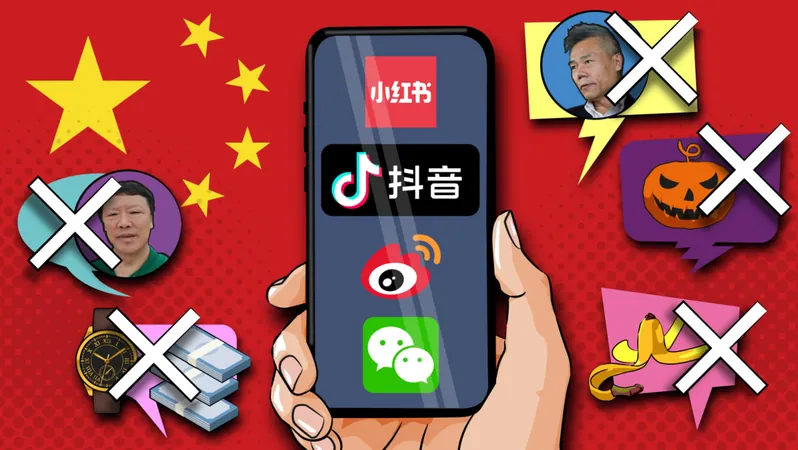
The Evolving Landscape of Censorship in China: From Tragedies to Everyday Memes
2024-11-15
Author: Wei
SINGAPORE
Amidst sorrow from China's deadliest mass killing in years, the country's internet censors are facing the challenge of containing an outcry from citizens. The tragic incident occurred on November 11 in Zhuhai, where a driver named Fan, aged 62, rampaged through a sports center, resulting in 35 deaths and numerous injuries.
Social media erupted with shock and horror as details emerged late on Monday night. Images depicting the aftermath spread rapidly across platforms like Weibo, where many users expressed outrage at the slow official response and questioned why it took nearly 24 hours for authorities to release crucial information regarding the events.
Comments lamenting the local government’s 'delayed efforts' surfaced only to be swiftly removed within the hour. Discontent escalated as netizens flooded formal media outlets’ pages, lamenting the lack of coverage surrounding the calamity while a military air show hogged headlines.
As censors worked diligently, vivid images of the crime scene that had circulated online were rapidly taken down—fueling speculation whether the removals were sparked by the disturbing nature of the content. Some posts citing eyewitness accounts also faced deletion before gaining visibility among users, further stifling discourse.
Expert commentary suggests this is standard practice following severe tragedies. Dr. Luwei Rose Luqiu, a researcher from Hong Kong Baptist University, noted that 'the police statement will be the only official explanation,’ indicating that discussions on the matter are actively repressed.
However, the Zhuhai incident is far from the only sensitive issue. In recent weeks following Halloween celebrations seen as emblematic of Western influence, police arrests targeting Halloween festivities in cities like Shanghai were promptly erased from public view. Clever netizens, using coded language to express dissent, turned to acronyms to avoid detection.
In a broader context, the crackdown on online expression has intensified. Recently, the state internet regulator issued a warning against the use of slang and abbreviations across social media. Terms deemed too informal, even those lacking a political connotation, have faced scrutiny, reflecting a growing restrictive atmosphere online. This initiative, known as the 'Clear and Bright' campaign, aims to snuff out any semblance of rebellion against government guidelines.
The government's focus even extends to seemingly innocuous phrases and memes. Many Chinese internet users engage in a continuous game of cat and mouse, employing clever linguistic shortcuts to discuss controversial topics without triggering censorship bots. For instance, referencing 'banana peel' can allude to Xi Jinping while sounding harmless to a casual observer.
While the authorities aim to curb humorous discontent, millions of Chinese netizens have shown resilience in creating new forms of expression and maintaining open conversations about sensitive issues. The booming internet community, comprised of approximately 1.09 billion users, adapts and evolves as quickly as censors respond.
Concerns rise over the growing sophistication of China's censorship mechanisms, particularly as the country progresses in artificial intelligence and data control efforts. Incidents of silencing even ardent pro-government supporters highlight the increasing paranoia of state officials.
The aspiration to manage discourse and maintain a specific narrative is evident in the handling of criticism, misinformation, and materialism online, with major platforms actively cleaning up posts promoting any form of perceived extravagance amid rising economic concerns.
Surveillance and restraint over public dialogue continue to stretch the boundaries of digital freedom, creating an atmosphere charged with tensions between freedom of expression and state expectations. As China treads further into an era of tight online governance, the ongoing struggle to retain autonomy in cyber conversation promises to become even more contested.


 Brasil (PT)
Brasil (PT)
 Canada (EN)
Canada (EN)
 Chile (ES)
Chile (ES)
 España (ES)
España (ES)
 France (FR)
France (FR)
 Hong Kong (EN)
Hong Kong (EN)
 Italia (IT)
Italia (IT)
 日本 (JA)
日本 (JA)
 Magyarország (HU)
Magyarország (HU)
 Norge (NO)
Norge (NO)
 Polska (PL)
Polska (PL)
 Schweiz (DE)
Schweiz (DE)
 Singapore (EN)
Singapore (EN)
 Sverige (SV)
Sverige (SV)
 Suomi (FI)
Suomi (FI)
 Türkiye (TR)
Türkiye (TR)